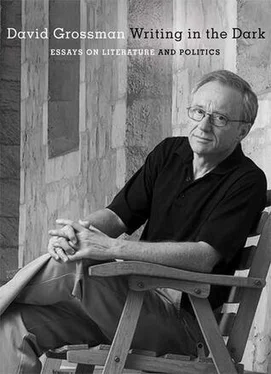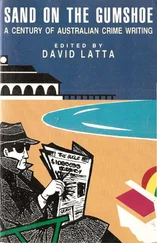From one book to the next I found that if I could be more precise in describing the relationship between the individual soul and this external arbitrariness, if I struggled a little harder with the depth of descriptions, the subtlety of sensations, the nuances of “being there,” I could conquer another millimeter of the void between myself and what had always seemed unalterable. Not that I found a better way to live in peace with the contradictions between body and mind; not that I truly understood how a man can erase himself to such a degree that he becomes part of a destructive machine; and not that if I were to describe the injustices of the Occupation it would be over. But my inner stance vis-à-vis the unalterable shifted slightly: I could give my own private names and definitions to states that had seemed frozen, eternal, monolithic, decreed from above or from below. I was no longer a victim of the things that had theretofore paralyzed me with fear and despair.
This feeling brings me to another precious source of inspiration and awe — the writing of Bruno Schulz. I first heard about The Street of Crocodiles (originally titled Cinnamon Shops ) from a stranger who phoned me one day after reading The Smile of the Lamb to tell me, warmly but firmly, that I was of course deeply influenced by Bruno Schulz. As I said, I did not know Schulz’s work at the time, and I was happy to learn how much he had influenced me. In fact, I have frequently been informed by my erudite critics about certain writers who have influenced me, and after reading them for the first time, I have discovered that the critics were correct.
Bruno Schulz, a Polish Jewish writer who lived in the town of Drohobycz, also in Galicia, was a modest art teacher who turned his small domestic life into a tremendous mythology, and today he is considered one of the greatest writers of the twentieth century. Bruno Schulz believed and hoped that our daily life was but a series of legendary episodes, fragments of ancient carved images, crumbs of shattered mythologies. He likened human language to a primeval snake that was long ago cut into a thousand pieces — these pieces are the words that have ostensibly lost their primeval vitality and now function solely as a means of communication, yet still, always, they continue “to search for one another in the dark.”
On every page written by Bruno Schulz one can feel this restless search, the longing for a different, primordial wholeness. His stories are full of the moments of first contact, when words suddenly “find one another in the dark.” That is when an electric spark of sorts occurs in the reader’s consciousness, awakening the sense that a word he or she has heard and read a thousand times can now momentarily reveal its private name.
Only two collections of Schulz’s short stories have been published, as well as a few other shorter works. He wrote a novel titled The Messiah , which was lost, and no one knows for certain what it contained. I once met a man who told me that Schulz had shown him the first few lines of the novel: Morning rises above a town. A certain light. Towers. That was all he saw.
Although Schulz did not write much, life bursts forth from every page he did produce, overflowing, becoming worthy of its name, a colossal effort that occurs simultaneously on all levels of consciousness and unconsciousness, illusion and nostalgia and nightmare. I read the book over the course of one day and night in a total frenzy of the senses, and my feeling — which now slightly embarrasses me — will be familiar to anyone who has been in love: it was the knowledge that this other person or thing was meant only for me.
I read the entire book ( Cinnamon Shops & Sanatorium Under the Sign of the Hourglass , published in Hebrew by Schocken) without knowing a thing about Bruno Schulz, and when I reached the end, I read Yoram Bronowski’s afterword, where I learned the story of Schulz’s death. In the Drohobycz ghetto, Schulz had a protector and employer in the form of an S.S. officer named Landau, who had Schulz paint murals in his home and stable. The officer had a rival, another S.S. officer named Günter, who lost a card game to Landau. Günter met Bruno Schulz on a street corner and shot him dead to hurt his employer. When the two officers later met, the murderer said: “I killed your Jew.” To which the other responded: “Very well. Now I will kill your Jew.”
After reading this account, I felt that I did not wish to live in a world in which such monstrosities of language could be uttered. But this time, unlike my paralysis at age ten — after realizing the connection between the horrors of the Holocaust and the characters of Sholem Aleichem — I had a way to express what I felt. I wanted to write a book that would tell readers about Bruno Schulz. It would be a book that would tremble on the shelf. The vitality it contained would be tantamount to the blink of an eye in one person’s life — not “life” in quotation marks, life that is nothing more than a languishing moment in time, but the sort of life Schulz gives us in his writing. A life of the living.
I know that many readers of See Under: Love found it difficult to get through the chapter on Bruno Schulz. But for me, that is the core of the book, the reason I wrote it, the reason I write. When people tell me they were unable to read it, I am regretful over the missed encounter, which is why the meetings I have had with those who were willing to delve into that chapter with me are so precious. The book has since been translated into several languages, and nothing makes me happier than the fact that in each language in which the book has appeared, new editions of Bruno Schulz’s writings have soon followed, and more and more people have become acquainted with this wonderful writer.
When I was invited to write about my sources of inspiration, I was asked which books I would like to discuss and what should be included in the bibliography for students. I began to think about which books and writers have influenced me and shaped my writing, and there have been so many: the stories of A. B. Yehoshua, Amos Oz’s Hill of Evil Counsel , Kafka’s works, Thomas Mann’s Magic Mountain , Heinrich Böll, Virginia Woolf, and many others. Of course I was tempted to lecture about Joyce and Camus, of whom I am particularly fond, and to frustrate some of the distinguished scholars with quotations from a Greenlandic epic they have never heard of.
But when Bialik wrote his poem “My Song,” he did not speak of his literary sources of inspiration. That was not the poem in which he described the bookshelves he stood facing as a boy, and later left behind. “Do you know whence I derived my song?” he asks. And he replies by recalling the dry, empty voice of a cricket that lived in his father’s house, and his mother’s deep sigh when she was widowed.
A cricket, a sigh.
And so I will not speak of authors or books that inspired me, but of an almost physical sensation that may not be a source of inspiration in the traditional sense, yet I feel it is a distinct root of my need to write. I find it difficult to reduce this sensation to a verbal definition. Bruno Schulz talks of suffocation within “the fortressed walls of tedium that close in on us”; perhaps it is that suffocation. Perhaps it is a type of claustrophobia that arises within the words of others. To understand it, I wrote a whole book, The Book of Intimate Grammar , which is the story of a young man who cannot accept the burden of all the conventions and routines that surround him, or the verbal clichés, or even the restrictive, unequivocal, physical dictates of his own body.
The book takes place in 1960s Jerusalem. Aron Kleinfeld lives in what is essentially a society of refugees, filled with people who have recently escaped a catastrophe and are trying with their last remaining strength to create a new life, a new language. With sometimes grotesque fervor, they grasp onto objects, food, anything with tangible volume. They create a solid, corporeal, unequivocal world, and it is naturally a world that is extremely belligerent and arbitrary, recklessly invading the privacy of its individuals.
Читать дальше












